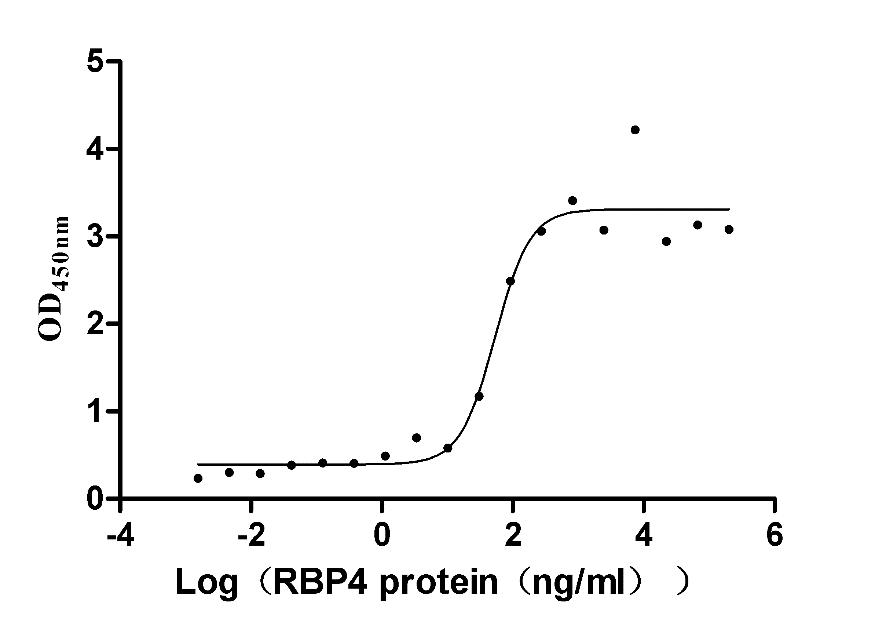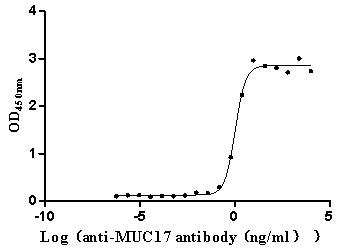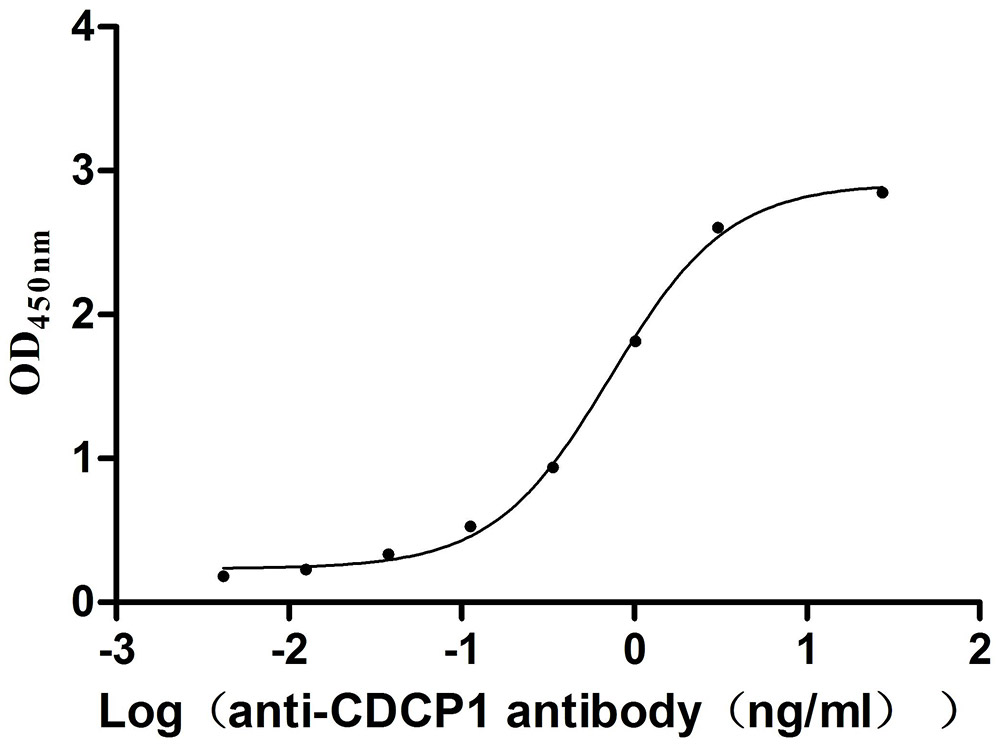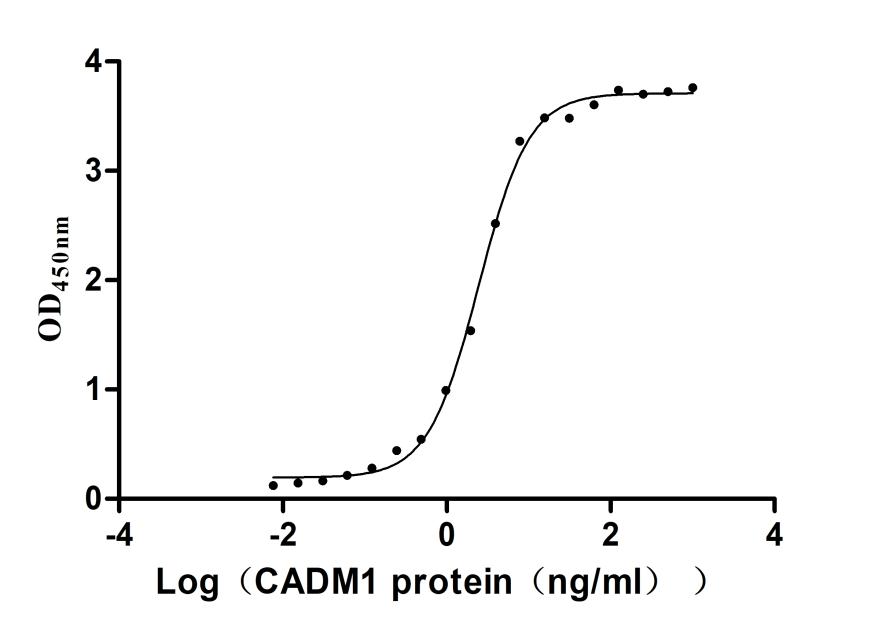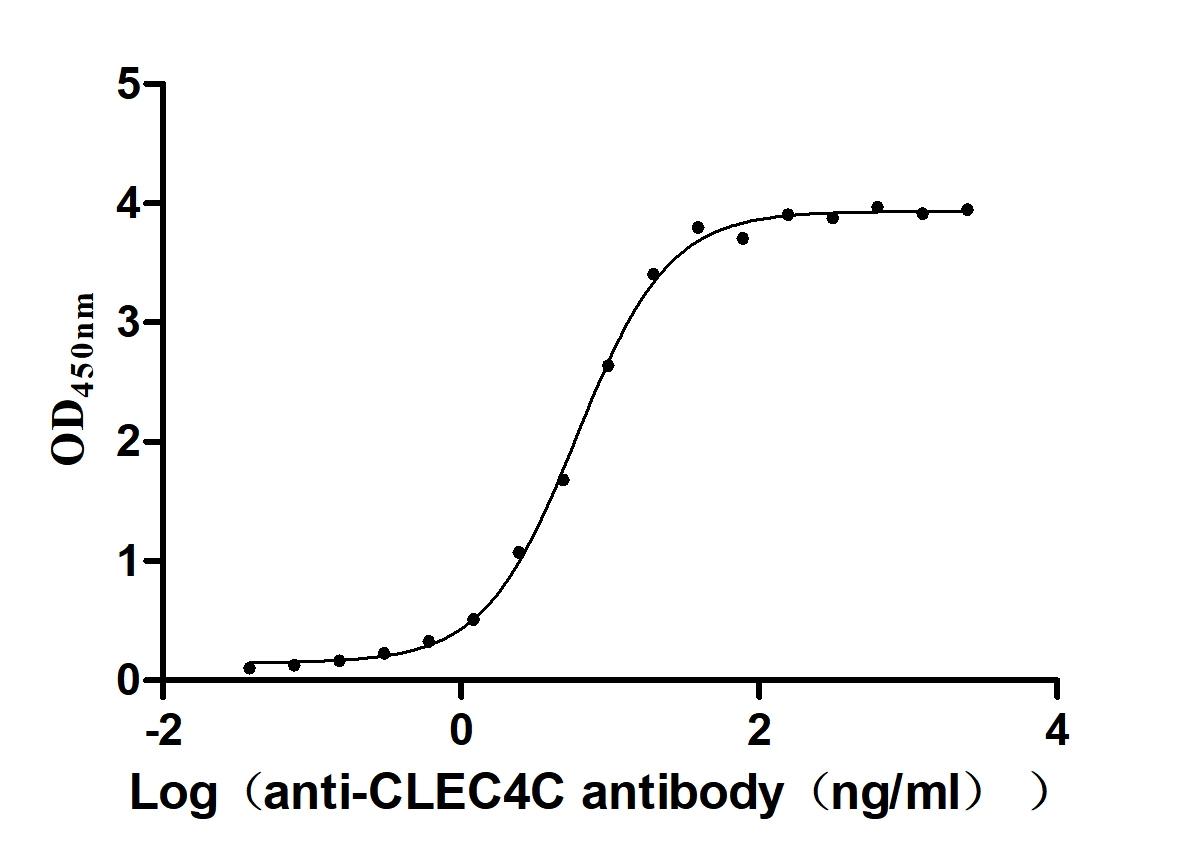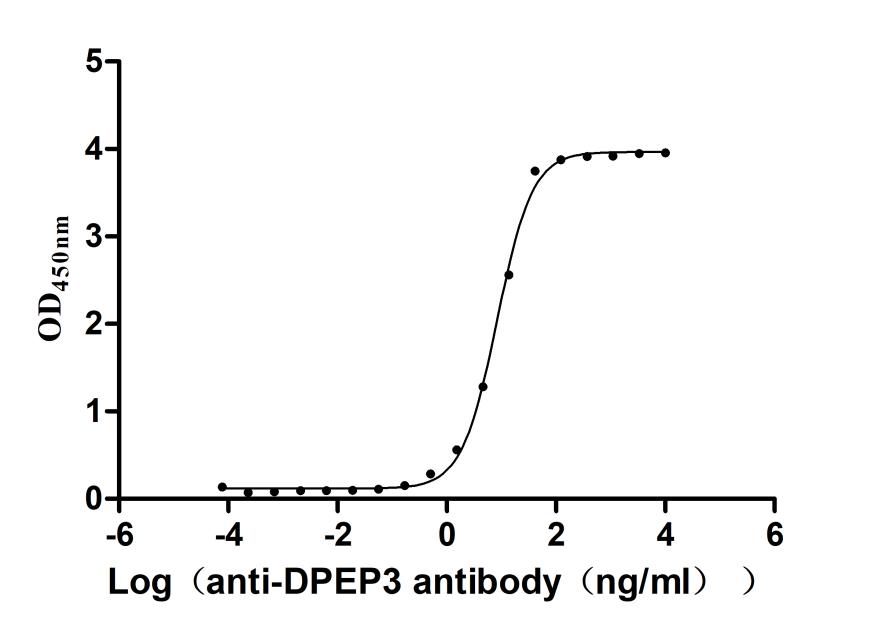Recombinant Mouse Protransforming growth factor alpha (Tgfa), partial
-
中文名称:小鼠Tgfa重组蛋白
-
货号:CSB-YP023445MO
-
规格:
-
来源:Yeast
-
其他:
-
中文名称:小鼠Tgfa重组蛋白
-
货号:CSB-EP023445MO
-
规格:
-
来源:E.coli
-
其他:
-
中文名称:小鼠Tgfa重组蛋白
-
货号:CSB-EP023445MO-B
-
规格:
-
来源:E.coli
-
共轭:Avi-tag Biotinylated
E. coli biotin ligase (BirA) is highly specific in covalently attaching biotin to the 15 amino acid AviTag peptide. This recombinant protein was biotinylated in vivo by AviTag-BirA technology, which method is BriA catalyzes amide linkage between the biotin and the specific lysine of the AviTag.
-
其他:
-
中文名称:小鼠Tgfa重组蛋白
-
货号:CSB-BP023445MO
-
规格:
-
来源:Baculovirus
-
其他:
-
中文名称:小鼠Tgfa重组蛋白
-
货号:CSB-MP023445MO
-
规格:
-
来源:Mammalian cell
-
其他:
产品详情
-
纯度:>85% (SDS-PAGE)
-
基因名:
-
Uniprot No.:
-
别名:Tgfa; Protransforming growth factor alpha [Cleaved into: Transforming growth factor alpha; TGF-alpha; EGF-like TGF; ETGF; TGF type 1)]
-
种属:Mus musculus (Mouse)
-
蛋白长度:Partial
-
表达区域:24-97
-
氨基酸序列ENSTSPLSDSPVAAAVVSHFNKCPDSHTQYCFHGTCRFLVQEEKPACVCHSGYVGVRCEH ADLLAVVAASQKKQ
-
蛋白标签:Tag type will be determined during the manufacturing process.
The tag type will be determined during production process. If you have specified tag type, please tell us and we will develop the specified tag preferentially. -
产品提供形式:Lyophilized powder
Note: We will preferentially ship the format that we have in stock, however, if you have any special requirement for the format, please remark your requirement when placing the order, we will prepare according to your demand. -
复溶:We recommend that this vial be briefly centrifuged prior to opening to bring the contents to the bottom. Please reconstitute protein in deionized sterile water to a concentration of 0.1-1.0 mg/mL.We recommend to add 5-50% of glycerol (final concentration) and aliquot for long-term storage at -20℃/-80℃. Our default final concentration of glycerol is 50%. Customers could use it as reference.
-
储存条件:Store at -20°C/-80°C upon receipt, aliquoting is necessary for mutiple use. Avoid repeated freeze-thaw cycles.
-
保质期:The shelf life is related to many factors, storage state, buffer ingredients, storage temperature and the stability of the protein itself.
Generally, the shelf life of liquid form is 6 months at -20°C/-80°C. The shelf life of lyophilized form is 12 months at -20°C/-80°C. -
货期:Delivery time may differ from different purchasing way or location, please kindly consult your local distributors for specific delivery time.Note: All of our proteins are default shipped with normal blue ice packs, if you request to ship with dry ice, please communicate with us in advance and extra fees will be charged.
-
注意事项:Repeated freezing and thawing is not recommended. Store working aliquots at 4°C for up to one week.
-
Datasheet :Please contact us to get it.
相关产品
靶点详情
-
功能:TGF alpha is a mitogenic polypeptide that is able to bind to the EGF receptor/EGFR and to act synergistically with TGF beta to promote anchorage-independent cell proliferation in soft agar.
-
基因功能参考文献:
- Tgfa null mice are equally susceptible to spontaneous osteoarthritis development during aging. PMID: 27457421
- Here the s show that the mammalian rhomboid protease RHBDL4 (also known as Rhbdd1) promotes trafficking of several membrane proteins, including the EGFR ligand TGFalpha, from the endoplasmic reticulum (ER) to the Golgi apparatus, thereby triggering their secretion by extracellular microvesicles. PMID: 27264103
- TGF-alpha contributes to the progression of diabetic kidney disease. PMID: 28249836
- Perturbed meibomian gland and tarsal plate morphogenesis by excess TGFalpha in eyelid stroma. PMID: 26363126
- c-Myc and transforming growth factor alpha enhance the development of hepatic lesions due to mutant beta-catenin in transgenic mice. PMID: 25402175
- Reverse transcriptase polymerase chain reaction studies showed that three members, Tgfa, Hbegf,and Nrg1 of the EGF family were expressed in the epithelium cultured with FGF7 + LPA as well as in the epithelium freshly isolated from the rudiments. PMID: 24227310
- findings suggest that elevated PHD4 levels disturb the angiogenic balance in osteosarcoma via induction of the TGF-alpha pathway and inhibit tumor growth by reducing the expression of HIF-2alpha PMID: 24048703
- Interaction between IRF6 and TGFA genes contribute to the risk of nonsyndromic cleft lip/palate. PMID: 23029012
- TGFalpha appears to be an important growth factor regulating the conversion of cartilage to bone during the process of endochondral ossification. PMID: 22575362
- These results imply that TGFalpha stimulates proliferation of endometrial stromal cells through multiple mechanisms, including its regulation of Igfbp3 and Mmp3 transcription. PMID: 22639808
- ADAM-17 and TGF-alpha are strongly and locally upregulated following adult mice cortical damage. PMID: 21837653
- Different mechanisms regulate neurogenesis in neonatal and adult olfactory epithelium; fibroblast growth factor (FGF)2 and TGFalpha may have different roles throughout development. PMID: 21187124
- beta-catenin controlled both cell-autonomous and non-cell-autonomous hepatocyte proliferation, through direct transcriptional and complex control of cyclin D1 gene expression and of the expression of a new target gene, Tgfalpha. PMID: 21145869
- variable TGF-alpha expression may explain, in part, the genetic susceptibility to chronic kidney disease (CKD) progression. PMID: 21183591
- our results suggest that TGFalpha overexpression in mouse urogenital organs alone may not be responsible for tumor formation and epithelial hyperplasia, but is involved in bladder outlet obstruction PMID: 20638776
- This may be the first report of the expression of carcinogenesis-related molecules such as EGFR, K-ras, Cox2 and TGFalpha during chronic pancreatitis. PMID: 20660988
- EGFR-dependent increases in receptor ligands TGFa and PTGS2 likely drive diet-related tumor promotion PMID: 19903783
- TGFalpha has a role in the development of preneoplastic melanocytic lesions in the eye but not the skin PMID: 12394184
- TGF-alpha produced primarily in the somatotrophs mediates the stimulatory effects of estrogen on the DNA replication of pituitary cells in a paracrine or autocrine manner PMID: 12560605
- TGF-alpha might affect astrocytic hypertrophy without affecting microgliosis not only in the normal condition, but also in the pathological condition. PMID: 12866207
- In the fetal mouse, expression of tgf-alpha affects the ability of TCDD to inhibit prostatic bud formation in a region-specific manner. PMID: 14514962
- Induction of pulmonary fibrosis by TGF-alpha was independent of inflammation or early activation of TGF-beta. PMID: 14660483
- Transient induction of TGF-alpha during early alveologenesis permanently disrupted lung structure and function and caused chronic lung disease. PMID: 15090366
- MAGI-3 has a role in efficient trafficking of TGFalpha to the cell surface in polarized epithelial cells. PMID: 15652357
- TGF-alpha is not required for mouse renal cyst formation or kidney or liver disease progression PMID: 15774823
- role in inducing uteroglobin-related protein 2 expression PMID: 15811345
- significant role for stromal TGF-beta signaling in mammary tissue homeostasis and mammary tumor progression via regulation of TGF-alpha signaling pathways. PMID: 15856015
- Overexpression of TGFalpha in MT-TGFalpha mice and Menetrier's disease patients elicits ectopic expression in the fundus of Pdx1, consistent with the phenotype of antralization. PMID: 15887112
- TGF-alpha inhibits apoptosis in mouse blastocysts through upregulation of survivin expression PMID: 16079309
- the production of TGF-alpha by HRCC cells leads to the activation of EGFR on tumor-associated endothelial cells that serve as an essential target for therapy with tyrosine kinase inhibitors PMID: 16820093
- Epithelial cell proliferation and apoptosis in mammary glands, from transgenic mice engineered to develop mammary cancer due to expression in mammary epithelia of transforming growth factor alpha (TGF-alpha) or c-myc,was analysed. PMID: 17071603
- Contrary to what is observed in mice, Tgfalpha mRNA levels in the SCN of Muridae do not match timing of locomotor activity and are modulated by light PMID: 17289271
- unregulated TGFalpha expression in the mammary gland leads to oncogenesis that is dependent on ovarian steroids early in tumorigenesis PMID: 17334393
- TGF-alpha-overexpressing mice bore similarities to premature infants born in the saccular phase who develop bronchopulmonary dysplasia, including remodeling of the distal lung septae and arteries PMID: 17468132
- Muc1 is an important modulator of TGFalpha-dependent tumor progression PMID: 17638868
- Concomitant expression of TGFalpha and Kras(G12D) accelerates the progression of mPanIN lesions to metastatic pancreatic cancer and leads to the development of cystic papillary lesions resembling human intraductal papillary mucinous neoplasms (IPMN). PMID: 17785207
- TGFalpha has a novel suppressive function that contributes to decelerating distal lung cell proliferation synergistically with HB-EGF through EGFR in perinatal distal lung development PMID: 18069687
- PRL expands the pool of cells susceptible to tumorigenesis, which is then facilitated by PRL and TGF-alpha cross talk PMID: 18156207
- Widespread hyperplasia induced by transgenic TGFalpha in ApcMin mice is associated with regional effects on tumorigenesis PMID: 18310091
- Expression of imprinted Igf2 and Peg1/Mest genes in postimplantation parthenogenetic mouse embryos treated with transforming growth factor alpha in vitro PMID: 18825967
显示更多
收起更多
-
亚细胞定位:[Transforming growth factor alpha]: Secreted, extracellular space.; [Protransforming growth factor alpha]: Cell membrane; Single-pass type I membrane protein.
-
数据库链接:
KEGG: mmu:21802
STRING: 10090.ENSMUSP00000032066
UniGene: Mm.137222
Most popular with customers
-
Recombinant Mouse Retinol-binding protein 4 (Rbp4) (Active)
Express system: Mammalian cell
Species: Mus musculus (Mouse)
-
Recombinant Human Mucin-17 (MUC17), partial (Active)
Express system: Mammalian cell
Species: Homo sapiens (Human)
-
Recombinant Mouse CUB domain-containing protein 1 (Cdcp1), partial (Active)
Express system: Mammalian cell
Species: Mus musculus (Mouse)
-
Recombinant Human Cytotoxic and regulatory T-cell molecule (CRTAM), partial (Active)
Express system: Mammalian cell
Species: Homo sapiens (Human)
-
Recombinant Macaca fascicularis C-type lectin domain family 4 member C(CLEC4C), partial (Active)
Express system: Mammalian cell
Species: Macaca fascicularis (Crab-eating macaque) (Cynomolgus monkey)
-
Recombinant Macaca fascicularis Dipeptidase 3(DPEP3) (Active)
Express system: Mammalian cell
Species: Macaca fascicularis (Crab-eating macaque) (Cynomolgus monkey)


